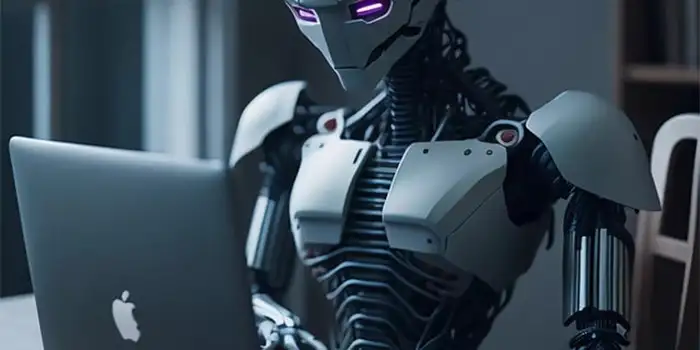I am aware that many people are concerned about how technology may affect jobs, and I share those worries as well. We are now seeing a world where technology is advancing so rapidly and I think it’s natural for us to wonder if it will eventually replace many of the jobs we rely on for our livelihoods.
Technology has the potential to take over jobs. It can replace some jobs with machines but also create new ones. The extent of how it will affect jobs depends on the industry and where you live. People need to learn new skills to keep up with these changes and adapt to the evolving market.
In this guide, you will learn:
- Will technology take over jobs?
- How will technology take over jobs
- What jobs will be replaced by technology
- What jobs will technology not replace
Will technology take over jobs?
Like what I’ve said from the start, technology has the potential to take over jobs. This means that as technology develops, certain duties that were formerly completed by people are now being carried out by machines or computer programs.
For instance, think about those popular self-checkout kiosks that are being developed today and then placed at some grocery stores.
These machines had obviously taken over the job of cashiers by scanning and bagging your items. A machine is already doing it instead of a person.
But the interesting part that I want to share with you is that technology doesn’t just take away jobs that easily, it can also create new ones for us. I want to take e-commerce as a perfect example of this.
Online shopping today has become a massive industry and I have noticed that it has generated countless jobs. There are now jobs in web design, digital marketing, and even drone operators for future deliveries.
As far as I know, these jobs never existed on a large scale before the Internet became widespread.
This will let you realize that the extent how which technology affects jobs varies depending on the industry and place where you live.
Let’s say in manufacturing, for instance, robots have taken over many repetitive and dangerous tasks. This means that some sorts of manufacturing personnel are no longer required.
On the other hand, there are also certain fields that incorporate technology that don’t affect jobs. The healthcare sector is the ideal illustration of this because it has created new technology and continues to provide plenty of chances for people with the necessary qualifications.
So, the question right now is what can individuals do to adapt to these changes? I believe that the only answer is to learn new skills.
This is the key if you think your job is at risk of being automated. You should develop marketable talents since they can help you become more resilient in the changing employment market.
I also want to say that being open to continuous learning is essential today because technology keeps evolving. Staying updated with the latest trends and tools in your field will surely help you remain competitive in the job market.
This might mean living outside the syllabus and taking online courses or seeking mentorship from someone who can surely help you.
How will technology take over jobs?
I want to tell you once again that if you’re not prepared to adapt, the possibility of technology taking over your job becomes all too real, it’s even happening right now.
The list that I’ll provide is how technology will take over your job.
1. Automation
Automation is first on my list because this is one of the most noticeable shifts that is happening in different industries.
It has transformed the way work is done due to robots or computers. The tasks that were once performed by humans are now being performed by automation technology.
I have seen a lot of automated assembly lines today that have replaced human labor for tasks like welding or quality control.
For example, the car manufacturing industry uses robots to weld car parts together and perform precision tasks that require consistency.
There is also automation in retail and service industries like the self-checkout kiosks which have replaced human cashiers.
2. Artificial Intelligence
AI today is getting popular and it can perform tasks that typically require human intelligence such as understanding natural language and recognizing patterns.
There are customer support companies today who are planning to invest in AI-powered chatbots to replace their workers.
I believe the numerous sectors will adapt to the change and invest more in AI in the near future.
3. Task-specific Technology
Technology created specifically for a given activity or function within a given industry is known as task-specific technology.
These devices are designed to work precisely and effectively in a predetermined manner. It can even outperform their human counterparts.
I’m in the mechanical engineering field and I’ve done a lot of work with these machines. The best example that I can give is in the agriculture industry.
There are machines like automated planters and harvesters that was invented to plant a row of crops and harvest field efficiently.
There are even automated tractors guided by GPS to navigate large fields. With these task-specific machines, the need for human workers will be reduced.
4. Predictive Analytics
The fact that it forecasts upcoming occurrences or trends using data and mathematical algorithms makes this a potent technology that is now gaining popularity.
In simple terms, you’re like having a crystal ball made of data that can help organizations make smarter decisions.
The way predictive analytics will take over the jobs of humans is by automation decision-making processes that were traditionally done by people.
Let’s try to imagine a company’s sales department. In the past, the salespeople out there relied on their experience or intuition to identify potential customers. They will also decide which leads they want to prioritize.
With predictive analytics, it can now analyze vast amounts of customer data easily. Additionally, it can spot patterns that people would miss.
What jobs will be replaced by technology?
I will be honest with you but technology will be leaving its mark on most jobs. However, the concern of complete replacement of human roles is not the most common outcome.
In the manufacturing industry, a lot of workers today are witnessing the increased presence of machines and robots because these technologies excel at repetitive tasks.
Retail cashier jobs will also be affected because of self-checkout kiosks in many stores. I’ve been repeating this because I have seen stores that are investing in checkout machines.
Telemarketing jobs will also be affected by technology because of AI-driven chatbots. It can take on routine telemarketing tasks such as responding to queries from customers.
Here are some other human jobs that will likely be replaced or affected by technology:
- Drivers: Self-driving vehicles may change the landscape for truck drivers and delivery drivers.
- Administrative Assistants: Automation can handle tasks like scheduling and email management.
- Fast Food and Restaurants: Automation in the food industry can include cooking and assembly processes, potentially reducing the demand for some kitchen staff.
- Data-Heavy Roles: Technology is streamlining jobs that need a lot of data, such as data input and basic analysis. Compared to people, computers can analyze and enter data far more quickly and correctly. The nature of jobs that require dealing with data is altering as a result of this.
I want you to remember that technology isn’t solely about job replacement. It also creates new opportunities for us.
There’s no need to be scared about the rapid advancement of technology because this potential take-over isn’t necessarily a final verdict.
What jobs will technology not replace?
As I’ve said, technology is leaving its mark on most jobs, but I believe that there are jobs that will only be slightly affected, or perhaps not at all by those advancements in tech.
There are professions or roles in this society that really rely on unique human qualities and creativity.
The first example that I can give is healthcare workers. I know that technology can assist them in diagnosis and treatment but the core of the healthcare is built on empathy and interpersonal skills.
Technology can aid them, but it can’t replace the human touch and emotional support that patients often need.
Our educators also fall into this category because they do more than just convey information. They inspire and guide their students so that they can surely learn.
Other human jobs that technology is unlikely to replace include the following:
- Scientists and Researchers: While technology aids in data collection and analysis, the creativity, intuition, and insight of scientists and researchers drive innovation and discovery.
- Law Enforcement: Police officers, firefighters, and paramedics often face unpredictable and high-stress situations where quick decision-making and human judgment are critical.
- Social Workers: Social workers always deal with difficult human situations which means they have a characteristic that needs empathy and understanding. Technology can aid them with administrative tasks, but the main focus of their involves building relationships with people.
- Creative Professions: This profession heavily relies on creativity and originality. This is mostly achieved by artists, writers, and many more. Technology can assist them but the essence of artistic expression remains uniquely human.
- Leaders and Managers: Leaders and managers are very in-demand positions and this job requires great interpersonal skills. Technology can give them some insights but the art of leading is still mostly a human domain.
Technology will continue to evolve in the future but there are roles where human qualities and capabilities will remain irreplaceable.
I know these roles will be enhanced by technology, but it can’t fully replace the unique contributions that humans bring to them.
Final thoughts
Again, technology has only the potential to take over jobs, not the certainty. I want you to consider it as a tool in your hands, the way you handle it will determine its impact.
Consider the opportunities it may bring up rather than obsessing over the possibility that it may replace your current position.
Let’s step forward with the rise of technology and we need to start embracing it as a partner in our career or profession.










